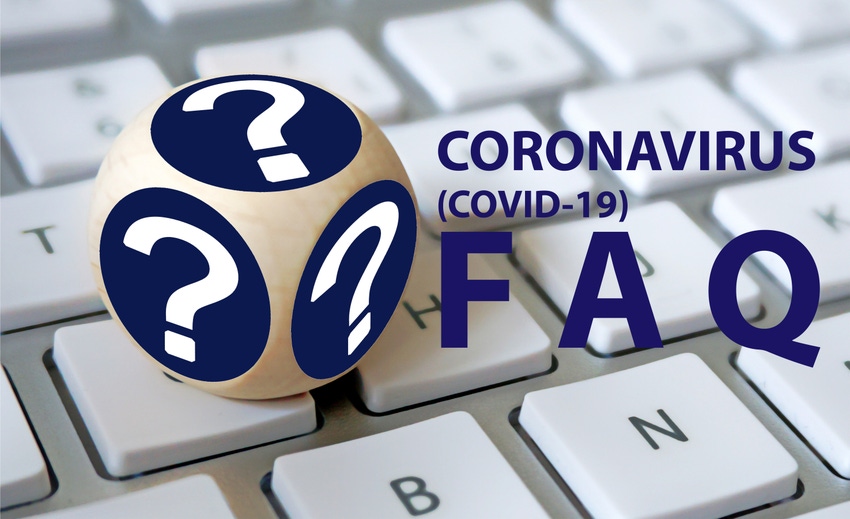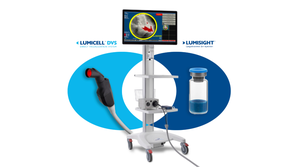The agency updated its list of frequently-asked questions related to both diagnostic testing and antibody testing for COVID-19.
May 5, 2020

The weeds of misinformation about COVID-19 are tall and thick, but an update to FDA's frequently-asked questions page should clear some things up, both for test makers and the general public. Because this is such a fluid situation, we have also included the date in parentheses beside each question to indicate when the information was last updated by FDA.
Q: What is the difference between the types of available SARS-CoV-2 tests (May 4)
The term diagnostic test is generally used to refer to molecular or antigen tests, both of which can be used to diagnose infection with the SARS-CoV-2 virus. Molecular tests, also called Nucleic acid amplification tests (NAAT), detect the presence of viral RNA, and antigen tests detect the presence of viral proteins that are part of the SARS-CoV-2 virus. FDA-authorized NAAT tests for SARS-CoV-2 meet the standard for an emergency use authorization (EUA), and based on the current available data, FDA said it believes those tests are highly accurate. This means that a positive or a negative result from a NAAT test is likely to be true.
The terms serological or antibody tests are generally used to refer to tests that detect antibodies to the SARS-CoV-2 virus. Because the antibodies are part of the body’s immune response to exposure and not the virus itself, such testing cannot be used for diagnosis of infection. Antibodies to SARS-CoV-2 are generally detectable in blood several days after initial infection, although the duration of time antibodies are present post-infection is not well characterized, FDA noted. Individuals may have detectable virus present for several weeks following the development of detectable antibodies. However, detection of viral RNA by qRT-PCR in those samples does not necessarily equate with infectious virus. If IgG antibodies are present, it often indicates a past infection but does not exclude recently infected patients who are still contagious.
FDA said it is unknown how long IgM or IgG antibodies to the virus will remain present in the body after the infection has been cleared. It is also unknown whether these antibodies confer immunity to infection, the agency said.
Q: Are antibody tests used to diagnose SARS-CoV-2 infection? (May 4)
As mentioned above, the antibodies are part of the body's immune response to exposure and not the virus itself, so antibody testing cannot be used for diagnosis of infection. SARS-CoV-2 antibody tests are intended to aid in identifying individuals with an adaptive immune response to the virus, indicating recent or prior infection, by detecting antibodies to the virus in human blood specimens.
FDA emphasized that negative antibody results do not preclude acute SARS-CoV-2 infection and that, if acute infection is suspected, direct testing for SARS-CoV-2 is necessary. SARS-CoV-2 serology tests should be ordered only by clinicians who are familiar with the use and limitations of the test, the agency said.
Q: What is the purpose of antibody testing if it is not used for the diagnosis or exclusion of the virus? (May 4)
FDA says high-quality serological tests may help the medical community better understand how the immune response against the SARS-CoV-2 virus develops in patients over time and how many people may have been infected. While there is a lot of uncertainty with this new virus, FDA said it is possible that, over time, broad use of antibody tests and clinical follow-up will provide the medical community with more information on whether or not a person who has recovered from the virus is at lower risk of infection (and for how long) if they are exposed to the virus again.
Although not everyone who is infected will develop an antibody response, appropriately validated serology tests, when used broadly, can be useful in understanding how many people have developed an adaptive immune response to the virus and how far the pandemic has progressed, FDA said.
Q: Are there any tests I can purchase to test myself at home for COVID-19? (April 20)
At this time, the FDA has not authorized any COVID-19 test to be completely used and processed at home. However, on April 20, the agency authorized the first COVID-19 test for home collection of specimens to be sent to a laboratory for processing and test reporting. That test is LabCorp's COVID-19 RT-PCR test. FDA noted that it does see the public health value in expanding the availability of COVID-19 testing through safe and accurate tests that may include home collection, and the agency is actively working with test developers in this space.
Q: What laboratories are offering diagnostic tests under the policy outlined IV.A of the Policy for Coronavirus Disease-2019 Tests? (May 5)
For laboratories certified under CLIA to perform high-complexity testing and that seek to develop and perform diagnostic tests to detect the SARS-CoV-2 virus, FDA said it does not intend to object to the use of validated tests for specimen testing for a reasonable period of time after validation while the laboratory is preparing an emergency use authorization (EUA) request. The agency said 15 business days is a reasonable period of time to prepare an EUA submission for a test that has already been validated.
Many commercial and healthcare system/academic laboratories have notified FDA that they have validated their own COVID-19 test and have started patient testing as set forth in policy. A list of laboratories that have provided such notification is included on FDA's website. Tests that have been issued an EUA can be found on the agency's EUA page.
The policy also gives states and territories the discretion to authorize high-complexity CLIA-certified laboratories within that state or territory to develop and perform tests for COVID-19.
Q: What states have chosen to authorize local laboratories to develop and perform COVID-19 tests (under its own state law)?
The following states have notified FDA that they choose to use this flexibility to expedite COVID-19 testing: Connecticut, Maryland, Mississippi, Nevada, New Jersey, New York Department of Health Wadsworth Center, and Washington State Department of Health.
Q: Can I use an EUA-authorized SARS-CoV-2 molecular diagnostic test or develop my own SARS-CoV-2 molecular diagnostic test for screening of asymptomatic individuals (people not showing symptoms consistent with COVID-19)? (May 5)
At this time, most EUA-authorized SARS-CoV-2 molecular diagnostics are authorized for use in individuals suspected of COVID-19 by their healthcare providers. Testing of asymptomatic individuals who are suspected of COVID-19 is at the discretion of the healthcare provider ordering the test, FDA said.
If a developer would like to develop a test with an intended use including broad screening of asymptomatic individuals, that test developer should reach out to [email protected] to discuss the validation necessary to support an EUA for such an indication, the agency said.
Q: I am developing a SARS-CoV-2 antibody test and want to pursue an EUA. Do I need to have all of my validation and documentation completed and submitted in an EUA request before engaging with the agency? (May 4)
FDA said it is interested in early interactions with test developers and will review data on a rolling basis. The agency encouraged test developers to reach out to the agency at [email protected] to begin pre-EUA discussions, even if the developer does not have their validation and documentation completed. FDA said it can work with developers on the best approach for completing validation, documentation, and submission of the EUA request. The agency also said that if test developers intend to submit a notification and begin offering their test before FDA issues an EUA, they should refer to section IV.D of the Policy for Coronavirus Disease-2019 Tests.
Q: What are the current validation study recommendations for a new SARS-CoV-2 antibody test? (May 4)
FDA recommends the following studies be performed for serology tests: cross-reactivity, class specificity, and clinical agreement. Depending on the characteristics of the test, such as what specimen types the developer is claiming, additional validation studies may be recommended in the guidance, e.g., matrix equivalency. The agency encouraged test developers to refer to section V.C of the Policy for Coronavirus Disease-2019 Tests for more guidance about validation studies.
Q: If I send my tests to the National Cancer Institute for evaluation, can I use the data they collect to support an EUA request?
Yes. On April 28, FDA issued an umbrella emergency use authorization for SARS-CoV-2 antibody tests (lateral flow or enzyme-linked immunosorbent assay tests that have been evaluated in an independent validation study performed at the National Institutes of Health’s National Cancer Institute (NCI), or by another government agency designated by FDA, and are confirmed by FDA to meet the criteria set forth in the Letter of Authorization. Under this EUA, authorized devices are intended for use as an aid in identifying individuals with an adaptive immune response to SARS-CoV-2, indicating recent or prior infection, by detecting antibodies (IgG, or IgG and IgM, or total), as specified in each authorized device’s instructions for use, to SARS-CoV-2 in human plasma and/or serum. Emergency use of devices authorized under the umbrella EUA is limited to laboratories certified under CLIA to perform moderate or high complexity tests.
About the Author(s)
You May Also Like




